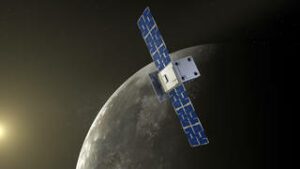
Credit: Illustration by NASA / Daniel Rutter
Edinburgh, 29 June 2022. – NASA’s Cislunar Autonomous Positioning System Technology Operations and Navigation Experiment (CAPSTONE) CubeSat, designed to test a unique lunar orbit, successfully launched on Rocket Lab’s Electron rocket. The spacecraft acts as a pathfinder for Gateway, NASA’s lunar space station supporting the Artemis program.
CAPSTONE is currently in low-Earth orbit, with separation and initial acquisition for the spacecraft expected in the next five days. The CubeSat is attached to Rocket Lab’s Lunar Photon, an interplanetary third stage helping the spacecraft to reach its orbit. Photon will release CAPSTONE on a ballistic lunar transfer trajectory utilizing the satellite’s own propulsion along with the Sun’s gravity to reach Moon’s orbit. It will take the spacecraft about four months to reach its targeted lunar orbit, the agency said.
CAPSTONE will operate for at least six months in a near rectilinear halo orbit, circling the Moon every six and a half days studying dynamics. The mission will showcase key technologies, like the Cislunar Autonomous Positioning System to be used with NASA’s Lunar Reconnaissance Orbiter. CAPSTONE will also test a one-way ranging capability built into its radio to reduce ground network time needed for in-space operations, NASA said.
 SpaceWatch.Global An independent perspective on space
SpaceWatch.Global An independent perspective on space




